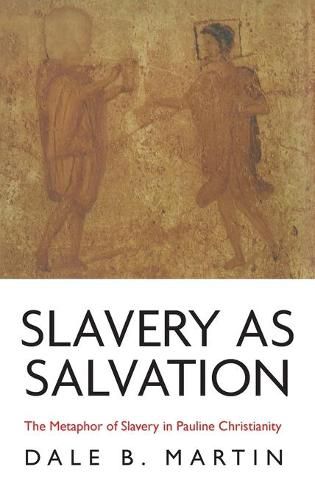Readings Newsletter
Become a Readings Member to make your shopping experience even easier.
Sign in or sign up for free!
You’re not far away from qualifying for FREE standard shipping within Australia
You’ve qualified for FREE standard shipping within Australia
The cart is loading…






This title is printed to order. This book may have been self-published. If so, we cannot guarantee the quality of the content. In the main most books will have gone through the editing process however some may not. We therefore suggest that you be aware of this before ordering this book. If in doubt check either the author or publisher’s details as we are unable to accept any returns unless they are faulty. Please contact us if you have any questions.
Early Christians frequently used metaphors about slavery, calling themselves slaves of God and Christ and referring to their leaders as slave representatives of Christ. Most biblical scholars have insisted that this language would have been distasteful to potential converts in the Greco-Roman world, and they have wondered why early Christians such as Paul used the image of slavery to portray salvation. In this book Dale B. Martin addresses the issue by examining the social history and rhetorical and theological conventions of the times. The first half of the book draws on a variety of historical sources - inscriptions, novels, speeches, dream-handbooks, and agricultural manuals - to portray the complexity of slavery in the early Roman empire. Concentrating on middle-level, managerial slaves, Martin shows how slavery sometimes functioned as a means of upward social mobility and as a form of status-by-association for those slaves who were agents of members of the upper class. For this reason, say Martin,
slavery of Christ,
brought the Christian convert a degree of symbolic status and lent the Christian leader a certain kind of derived authority. The second half of the book traces the Greco-Roman use of political rhetoric that spoke about populist leaders as
enslaved
to their followers, especially to members of the lower class. This provides the context for Paul’s claim, in 1 Corinthians 9, that he has enslaved himself to
all
- that is, to those very people he is supposed to lead as an apostle. Martin thus interprets this statement to mean that Paul identifies himself with the interests of persons with lower status in the Corinthian church, calling on those with higher status to imitate his self-debasement in order to further the interests of those below them on the social scale.
$9.00 standard shipping within Australia
FREE standard shipping within Australia for orders over $100.00
Express & International shipping calculated at checkout
This title is printed to order. This book may have been self-published. If so, we cannot guarantee the quality of the content. In the main most books will have gone through the editing process however some may not. We therefore suggest that you be aware of this before ordering this book. If in doubt check either the author or publisher’s details as we are unable to accept any returns unless they are faulty. Please contact us if you have any questions.
Early Christians frequently used metaphors about slavery, calling themselves slaves of God and Christ and referring to their leaders as slave representatives of Christ. Most biblical scholars have insisted that this language would have been distasteful to potential converts in the Greco-Roman world, and they have wondered why early Christians such as Paul used the image of slavery to portray salvation. In this book Dale B. Martin addresses the issue by examining the social history and rhetorical and theological conventions of the times. The first half of the book draws on a variety of historical sources - inscriptions, novels, speeches, dream-handbooks, and agricultural manuals - to portray the complexity of slavery in the early Roman empire. Concentrating on middle-level, managerial slaves, Martin shows how slavery sometimes functioned as a means of upward social mobility and as a form of status-by-association for those slaves who were agents of members of the upper class. For this reason, say Martin,
slavery of Christ,
brought the Christian convert a degree of symbolic status and lent the Christian leader a certain kind of derived authority. The second half of the book traces the Greco-Roman use of political rhetoric that spoke about populist leaders as
enslaved
to their followers, especially to members of the lower class. This provides the context for Paul’s claim, in 1 Corinthians 9, that he has enslaved himself to
all
- that is, to those very people he is supposed to lead as an apostle. Martin thus interprets this statement to mean that Paul identifies himself with the interests of persons with lower status in the Corinthian church, calling on those with higher status to imitate his self-debasement in order to further the interests of those below them on the social scale.